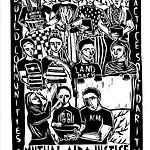Friends! Comrades!
Welcome to another episode of the Radio Reversal podcast, continuing our series on Disaster, Crisis & Collective Futures.
If you haven’t already listened to the first couple of episodes in this series - never fear! You can jump in fresh here, or head back and listen to Episode 12 - After the Flood & Episode 13 - Disaster Communism with Nick Southall. In these episodes, we chatted about weather events like Cyclone Alfred & what happens during “disasters”: how the parameters of political possibility shift, sometimes incrementally, and sometimes all at once. We talked about two very different expressions of these political ruptures: “disaster capitalism,” where corporations and the state use these events as opportunities to expand state and corporate power and to find new frontiers of capitalist exploitation, and “disaster communism,” in which communities self-organise to support one another, forge networks of mutual aid and care, and build a genuinely radical sense of “class power.”
This week, Nat, Jonno & I (Anna) decided to focus a bit more on the way that these dynamics operate in the specific conditions of settler colonialism, especially here in so-called australia. We’re engaging with these topics as settlers, living uninvited on unceded Aboriginal and Torres Strait Islander lands, and this is perhaps part of why we are so interested in the way that crises operate as key moments in which settlers are brought into new forms of colonial complicity. In particular, we are digging into a concept that we’ve been talking about for a few years now: the idea of “crisis colonialism.” We use this as a shorthand way to think about how settler colonial states use periods of crisis - economic depressions, world wars, ecological disasters - as fuel for settler colonial nation-building.
In listening back to and editing this week’s episode, I realised (largely thanks to a generative conversation with Dr. Jamal Nabulsi, whose incendiary and vital work you can find here and here) that a lot of what we’re thinking about in this episode is affect - how people feel during crises, and how those collective emotions are operationalised and weaponised for a variety of political projects. This is a key part of both “disaster capitalism” and “disaster communism,” which we dig into in more detail at the beginning of this episode. But affect is also an important part of our analysis of “crisis colonialism,” and especially the way that settler colonies use moments of crisis to manufacture and secure settler consent for colonial governance through a rotating set of strategies, ranging from fear-based moral panics through to the construction of ideas of “mateship” and community.
So in this week’s episode, we’re looking closer at these dynamics. How exactly do settler colonial states take advantage of periods of crisis? How do these moments become repurposed as fuel for nation-building? How does “securitisation” and policing fit into this process? And as settlers who are engaged in communities of struggle and committed to disrupting settler colonialism… how can we ensure that our collective efforts in these moments don’t become fuel for the colonial project that caused the crisis in the first place?
This is a big, juicy episode, which means that we talk about (or reference) a bunch of important scholarship that helps us to understand the origins of colonial racial capitalism and the “disaster” horizon of the present. In kicking off with some belated “definitional work,” as Nat puts it, we start by sketching out a working understanding of “disaster capitalism.” We continue our chat about Naomi Klein’s 2007 “The Shock Doctrine: The Rise of Disaster Capitalism and her formative analysis of the way that corporations and states alike use periods of disaster, or “shocks,” to cultivate new “frontiers” to exploit. Klein talks about a number of examples of this phenomenon: from the ways that the destructive impacts of “natural disasters” like the 2004 Indian Ocean earthquake and tsunami can be used to create the conditions for massive land grabs and accelerated privatisation and development under the guise of “reconstruction”; through to the construction of an entire fear-based industry of “homeland security” after the 9/11 terror attacks in the US.
We follow this with a very brief chat about Antony Loewenstein’s (2015) Disaster Capitalism: Making a Killing out of Catastrophe, where he expands and updates Klein’s analysis to trace the diverse ways that disasters have become “big business,” looking at - as he puts it - the way that “companies cash in on organized misery in a hidden world of privatized detention centers, militarized private security, aid profiteering, and destructive mining.”
A thread that we allude to in the podcast but don’t extend is that these works are both interested in the affective impact of disasters on populations: the way that the confusion and “shock” of these events can be quickly turned into fear and suspicion which takes root within the established furrows of colonialism, racism and white supremacy; and which forms the basis of a new economy of privatised security, mass incarceration, and surveillance. Competing against this economy of fear, however, is a counter-economy of generosity, care and radical love that also takes root during disasters. We briefly return to Nick Southall’s brilliant account of “disaster communism,” discussed at length in last week’s show.
We then turn our attention to the “permanent crisis” of settler colonialism, a phrase drawn from Robin D G Kelley’s 2017 piece “Crisis: Danger, Opportunity & The Unknown,” in which he describes how colonial racial capitalism “produces something akin to a permanent state of crisis” because it is “built on fictions that must be constantly shored up, not for its victims but for those who stand to benefit.” We trace these contradictory fictions all the way back to the emergence of penal colonialism as a response to the crisis of prison overcrowding in Europe, drawing on the work of Michel Foucault, Cedric Robinson, Walter Rodney and Sylvia Federici to emphasise that penal colonialism was both a form of, and a factory for, crisis-management techniques.
Finally, we reflect on the many, violent fictions that have been required to enable and sustain the settler colonial project in so-called australia. We draw here on the incredible body of work by First Nations scholars, including Mununjahli & South Sea Islander scholar Chelsea Watego, Darumbal and South Sea Islander scholar and journalist Amy McQuire, Amangu Yamatji theorist Crystal McKinnon, Yuin scholar and criminologist Amanda Porter, Meintagk & Tanganekald scholar Irene Watson, Gumbaynggirr historian Gary Foley and Goenpul scholar Aileen Moreton-Robinson (among many others!) to understand the foundational contradictions of settler colonialism, and why they create the conditions of “permanent crisis” here in so-called australia.
From here, I draw out a point that I explore in my PhD thesis (supervised by Chelsea Watego, David Singh, Liz Strakosch & Alissa Macoun), in which I argued that Indigenous peoples’ unceded sovereignty and persistent resistance to colonisation represents a foundational and irresolvable contradiction for settler colonial states, which renders them constantly on the precipice of political crisis. This foundational crisis leads settler colonial states to develop robust and sophisticated techniques of crisis-management, ranging from repressive apparatus of policing, prisons, surveillance and punitive systems of state control; through to piecemeal liberal concessions, reforms, and promises of “inclusion.”
So what does this mean for how we approach the coming storm? We end this episode with some reflections on how we can build our collective ability to resist colonial complicity: how to refuse the promise of liberal reform; how to reject all attempts to narrow our care, grief and rage to those deemed “grievable” by the colonial state; and how we might work to align ourselves instead with everyone, everywhere, who is fighting to dismantle the colonial capitalist death machinery that causes the “permanent crisis” of the present.
Yours in solidarity,
The Radio Reversal Collective









Share this post